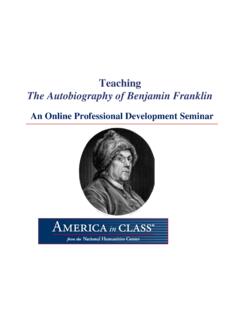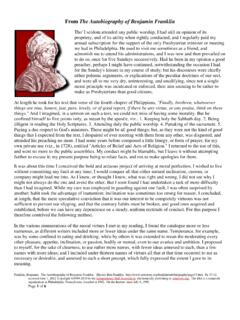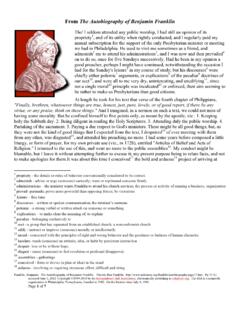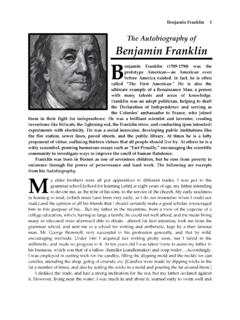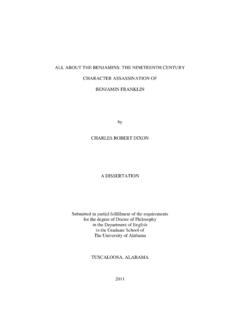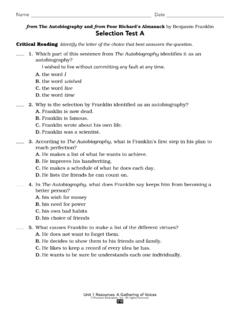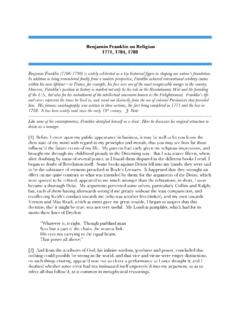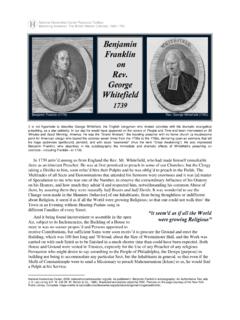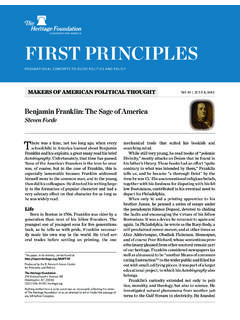Transcription of from The Autobiography Video link at - Monroe Co Schools KY
1 Writers of the Revolution(background) Page from Poor Richard s Almanackfrom The Autobiography by benjamin Franklindid you know? benjamin franklin .. started the first public library and fire department in America. founded what became the University of Pennsylvania. invented bifocal the AuthorPrinter, publisher, writer, scientist, inventor, businessman, philosopher, statesman benjamin franklin s numerous roles only hint at the man s tremendous versatility and talent. As the oldest founding father, franklin had already lived a full life when at the age of 70 he joined 40-year-old John Adams and 33-year-old Thomas Jefferson to draft the Declaration of Independence. Soon afterward, he loaned Congress a large sum of his own money and sailed on a leaky ship to France to arrange for more loans and a crucial alliance to fight the British.
2 His masterly efforts abroad on behalf of the American cause earned him a reputation as one of the most successful American diplomats of all time. Only a few years before he died, his presence at the Constitutional Convention helped unify the delegates. So great was his influence that he is credited with convincing them to approve the final document by a vote of 39 to 3. A man of great integrity, intelligence, and charm, Ben franklin embodied the best of the new nation and became its first Himself Up Born in Boston as the youngest of 15 children, franklin did not want to follow in his father s footsteps to become a candle and soap maker. Instead, he joined his brother in the printing business as an apprentice. With only two years of formal education, franklin taught himself to write by imitating the great essayists of his day.
3 At the age of 16, he was contributing satirical pieces to his brother s newspaper. By his own account too saucy and provoking as a youth, he soon quarreled with his brother and struck out on his own for Philadelphia. franklin did very well in Philadelphia, prospering in his own printing business, running the successful Pennsylvania Gazette newspaper, writing his popular Poor Richard s Almanack for 26 years, and being active in colonial of the World franklin s writing from humorous satires and wise sayings to serious political essays and scientific observations on electricity as well as his diplomacy and charismatic personality made him an international celebrity. Although respected by the great minds of his age, he never lost his connection to the common people.
4 In the words of John Adams: His reputation is greater than that of Newton, Frederick the Great or Voltaire, his character more revered than all of them. There s scarcely a coachman or a footman or scullery maid who does not consider him a friend of all mankind. benjamin franklin 1706 1790Go to KEYWORD: HML11-266 Author Online3ionUottap(background) Page fromPoor Richard s Almanackconvincing them to appdbfRichard s Almanackdocument by a vote of great integrity, intelliBen franklin embothe new nation Himself as the youngest oFranklin did nothis father s footscandle and soa266 RI 1 Cite textual evidence to support inferences drawn from the text, including determining where the text leave matters uncertain. RI 5 Analyze and evaluate the effectiveness of the structure an author uses in his or her exposition.
5 RI 6 Determine an author s point of view or link at 2661/6/11 10:32:04 AM1/6/11 10:32:04 AM Is perfection possible?As a young man, benjamin franklin believed that human beings could actually achieve perfection in a given area. All you needed was a reasonable plan and a lot of self-discipline. Many people today also aim for perfection, although their quest may take a different path. Bookstores have whole sections devoted to self-improvement in a variety of areas, including diet, exercise, careers, and Do you think perfection is possible or at least worth striving for? If you think so, outline a self-improvement plan that shows how you might achieve your goal. If you don t think perfection is possible, write a paragraph in which you explain why you think it is unattainable.
6 Text analysis: characteristics of autobiographyAn Autobiography is the story of a person s life, written by that person. As you read this excerpt from franklin s Autobiography , notice the following characteristics of Autobiography : First person: The author of an Autobiography usually writes from the first-person point of view. Dual perspective: Often the author of an Autobiography writes as an older person looking back on him- or herself as a younger person, providing opportunities for reflection. Significant moments: Autobiographies may vary from straightforward chronological accounts to impressionistic narratives. In either case, especially important events and people in the author s life are highlighted. reading skill: make inferences about the authorMaking inferences means reading between the lines making logical guesses based on evidence in the text to figure out what is not directly stated.
7 As you read The Autobiography ,make inferences about the values and motives that seem characteristic of franklin s personality. Use a chart like the one shown to record details from the text about the 13 virtues he hopes to acquire and how he goes about doing so. What inferences can you make about him?Details or Evidence from TextInferenceReview: Connect vocabulary in contextFranklin uses the following boldfaced words in describinghis efforts to improve himself. Restate each phrase, usinga different word or words for the boldfaced term. 1. unremitting storms that went on for weeks 2. felicity over her great good luck 3. a mansion as one symbol of affluence 4. dreamed up an artifice to avoid doing his job 5. incorrigible behavior that disgraced the family 6.
8 A trifling problem, easily cleared up 7. would often contrive to secretly meet his friendsComplete the activities in your Reader/Writer Autobiography 26712/22/10 4:43:34 PM12/22/10 4:43:34 PM268 unit 1: early american writing utobiography background franklin was a prolific writer, producing volumes of essays, travel journals, newspaper articles, satires, speeches, almanacs, letters, and even ballads. But his great masterpiece was his Autobiography , which is still very popular today. The following excerpt details franklin s plan to achieve moral perfection. He was about 20 years old when he first conceived the idea on one of his long, trans-Atlantic voyages. The plan reveals his faith in reason, order, and human perfectibility, which was typical of 18th-century was about this time I conceived the bold and arduous project of arriving at moral perfection.
9 I wished to live without committing any fault at any time; I would conquer all that either natural inclination, custom, or company might lead me into. As I knew, or thought I knew, what was right and wrong, I did not see why I might not always do the one and avoid the other. But I soon found I had undertaken a task of more difficulty than I had imagined. While my care was employed in guarding against one fault, I was often surprised by another; habit took the advantage of inattention; inclination was sometimes too strong for reason. I concluded, at length, that the mere speculative conviction that it was our interest to be completely virtuous, was not sufficient to prevent our slipping; and that the contrary habits must be broken, and good ones acquired and established, before we can have any dependence on a steady, uniform rectitude of conduct.
10 For this purpose I therefore contrived the following method. a In the various enumerations of the moral virtues I had met with in my reading, I found the catalogue more or less numerous, as different writers included more or benjamin FranklinTHEB enjamin franklin (1767), David Martin. Oil on canvas. White House Historical Association, Washington, Autobiography What characteristics of Autobiography do you find in the first paragraph of this selection?Analyze VisualsWhat do the details of this famous painting suggest about franklin ? 26812/22/10 4:42:40 PM12/22/10 4:42:40 PM the Autobiography 26912/22/10 4:42:53 PM12/22/10 4:42:53 PM270 unit 1: early american writing 1.
